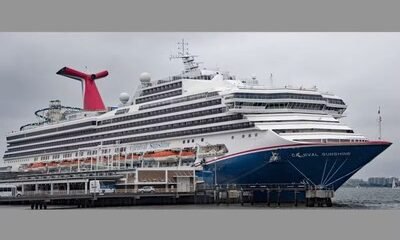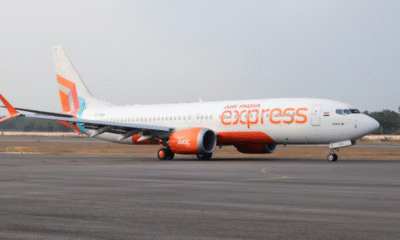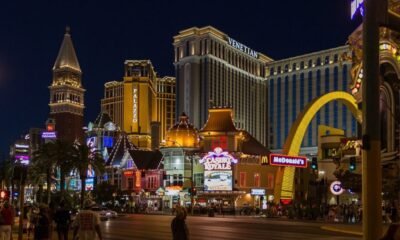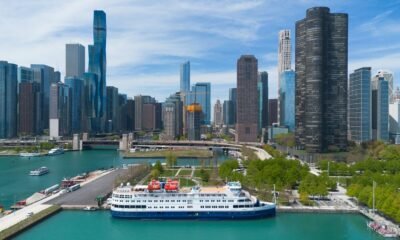Brand Stories
Brand USA’s Challenges, Hotel Immigration Crackdown and Air India’s Schedule Changes

Good morning from Skift. It’s Thursday, June 19. Here’s what you need to know about the business of travel today.
Brand USA is grappling with a potential federal funding cut and a fragile inbound travel recovery weighed down by global political tensions. CEO Fred Dixon discussed how the organization is preparing for both challenges as it launches a new marketing campaign in an interview with Skift Meetings Executive Editor Andrea Doyle.
Brand USA could see an 80% cut in federal funding as part of the “big, beautiful” tax bill that’s being negotiated in the Senate. However, Dixon expressed cautious optimism, noting President Trump’s budget proposal included full funding for Brand USA.
Brand USA has also unveiled a campaign called “America the Beautiful,” which Dixon says aims to re-center attention on U.S. travel. The campaign comes as inbound tourism has fallen in recent months.
Listen to This Podcast
🎧 Subscribe
Apple Podcasts | Spotify | Youtube | RSS
Next, U.S. hotels are working to comply with the Trump administration as it increases its crackdown on immigration, which threatens to make the sector’s labor shortage worse, writes Senior Hospitality Editor Sean O’Neill.
Trade groups in the hotel industry said they’re mobilizing to help members navigate compliance requirements. Those efforts come as ICE has ramped up workplace raids targeting industries that rely on immigrant workers, with officials stating they would continue to make arrests at worksites.
Hotels are already struggling with staffing shortages, particularly resort properties that depend on seasonal workers — especially in areas without large local workforces. O’Neill writes the hotel industry finds itself caught between competing pressures: the need for workers to fill essential but often low-paying jobs and the risk of legal consequences for employing people without proper documentation.
Finally, in the wake of last week’s fatal crash, Air India said Wednesday it would reduce international flying on widebody aircraft until mid-July, writes Airlines Reporter Meghna Maharishi.
Air India said it’s cutting international widebody service by 15% for several reasons, including enhanced safety inspections and airspace closures in parts of Europe and Asia. In addition, Maharishi notes the escalating Israel-Iran conflict has driven Air India to divert several routes.
The travel industry’s top event returns this fall.
September 16-18, 2025 – NEW YORK CITY
Brand Stories
‘Cruising is booming:’ Why luxury hotel brands are launching lavish cruise ships | Exclusive

Ritz-Carlton and Four Seasons are two of the world’s most renowned and expensive and hotel companies.
But forget staying in their hotel rooms – they’re among the top travel brands taking to the water.
And Waldorf Astoria – which is owned by Hilton – is the latest travel firm to strike out, launching a luxury Nile cruise in 2026.
DEAL: Save hundreds on a Queensland holiday with Discovery Parks
More akin to mega yachts and much smaller than regular cruise ships these vessels hold just a few hundred cashed-up guests.
Ritz Carlton recently launched its third ship, Luminara, with an A-list filled party.
READ MORE: Why Orange is the ultimate winter escape you haven’t considered (but really should)
Models Kendall Jenner and Naomi Campbell, TV host Martha Stewart, and actors Orlando Bloom and Kate Hudson were among those invited to the extravagant party.
Outside of hotels, on-the-ground tour company Trafalgar announced it is also expanding into river cruising with two new ships, the Trafalgar Verity and Trafalgar Reverie, for sailings on the Rhine and Danube rivers, starting in April 2026.

Ted Blamey Principal at specialist cruise consulting firm CHART Management Consultants says there are many reasons all these firms want in on the water-bound holidays.
“The first is basically that cruising is booming, so it’s a great opportunity for experienced travel and accommodation companies to capitalise on,” he tells 9Travel.
“Second, I guess, would be, that these organisations, they have very powerful existing guest basis.
READ MORE: Hawaii is the most popular US destination for Aussies, as new figures show a major shift in travel

“They have a very significant number of past guests who are loyal to the brand, and love it, and why not offer them something new that will continue to get their loyalty and of course, earn revenues.
“I guess another reason is that these same people are open to new experiences.”
Meanwhile he said cruising is unique from a business point of view because guests are captive on the vessel much of the time.
And that means you can control their holiday – as well as retain much of the money they pay to be there.
READ MORE: Best time to visit Bali: How to avoid crowds, high prices and the rainy season

The new players are competing against other luxury cruise brands such as Crystal Crusies, Ponant, Explora Journeys, Azamara, Silversea, and Regent Seven Seas.
But this could be good for the whole industry Ted says.
“I think all of us in the industry have felt for years that competition is a good thing, it grows the market,” he says.

Even Orient Express, most famous for its lavish trains, is getting involved. It’s planning the world’s largest sailing ship, Orient Express Silenseas, for next year.
Smaller Swiss brand, Aman is also setting sail.
Meanwhile, images show the first vessel for Four Seasons won’t be anything like normal cruiser.
The yacht will have an extendable marina on both sides for water sports, swimming or simply posing for Instagram photos.

Captain Kate McCue has jumped ship from Celebrity Cruises to captain it.
But one thing all the vessels will have in common is that their high-net-worth guests can enjoy the finest things the world can offer.
That includes an almost one to one crew member to guest ratio, fine dining meals from top chefs and lavish suites with huge terraces.
Prices are not always widely advertised but run into the tens of thousands, making a trip something everyday Aussie cruises can only dream of.
Brand Stories
Vermont lawmaker co-chairs national AI task force

MONTPELIER, Vt. (WCAX) – A Vermont lawmaker has been selected to co-lead a national task force on artificial intelligence policy.
Bradford Democratic Rep. Monique Priestley co-chairs the task force with a Republican representative from Utah.
She says her focus is to learn more about how AI impacts consumer protection and data policy.
“Right now, AI is touching everything that we are interacting with. It’s used in software that determines if you can get a loan, if you can get an apartment, or whether or not you qualify for different education. Your health care is largely impacted by artificial intelligence,” Priestley said.
The task force will connect lawmakers with expert voices in the industry and create a first-of-its-kind bipartisan state AI policy memo to guide policymaking across the country.
Copyright 2025 WCAX. All rights reserved.
Brand Stories
Travel Companies Spent Big in the Second Quarter on Lobbying
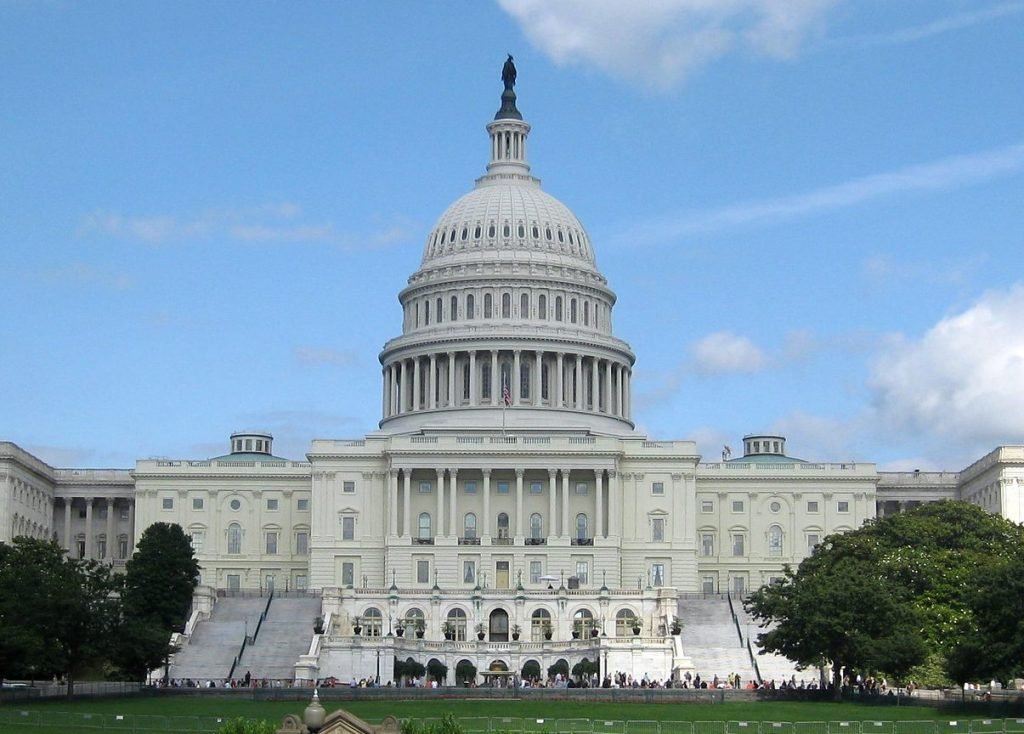
From April through June, the tourism and travel industries grappled with several political challenges at once: President Donald Trump’s “Liberation Day” tariff turbulence. Messy debates over the “One Big Beautiful Bill.” U.S. travel bans and declining tourism from abroad.
In response, many of the nation’s biggest airlines, hotels, travel service companies, and associated trade associations spent bigger-than-usual amounts to lobby Congress and the Trump administration, according to a Skift analysis of new federal lobbying disclosure documents filed Monday.
This government influence spending, which includes money spent on both in-house and for-hire lobbyists in Washington, D.C., is designed to defend industry and corporate interests and advocate for favorable policies and legislation.
Among the notable revelations:
Where Spending Rose
Trade Groups: The U.S. Travel Association reported a spike in its lobbying activity during the second quarter ($1.03 million) versus a year earlier ($900,00).
It was also well beyond what it spent during the same period in 2021 during Joe Biden’s first year as president ($840,000) and in 2017 during the first year of Trump’s first term ($640,000).
“Lobbying expenditures during the first year of a new presidential administration or new Congress typically increase — along with legislative and regulatory action — compared to the previous year,” U.S. Travel Association spokesperson Spencer
-

 Brand Stories2 days ago
Brand Stories2 days agoBloom Hotels: A Modern Vision of Hospitality Redefining Travel
-

 Brand Stories22 hours ago
Brand Stories22 hours agoOlive Living: India’s Intelligent, Community-Centric Hospitality Powerhouse
-

 Destinations & Things To Do3 days ago
Destinations & Things To Do3 days agoUntouched Destinations: Stunning Hidden Gems You Must Visit
-

 AI in Travel3 days ago
AI in Travel3 days agoAI Travel Revolution: Must-Have Guide to the Best Experience
-

 Brand Stories3 weeks ago
Brand Stories3 weeks agoVoice AI Startup ElevenLabs Plans to Add Hubs Around the World
-

 Brand Stories2 weeks ago
Brand Stories2 weeks agoHow Elon Musk’s rogue Grok chatbot became a cautionary AI tale
-

 Asia Travel Pulse3 weeks ago
Asia Travel Pulse3 weeks agoLooking For Adventure In Asia? Here Are 7 Epic Destinations You Need To Experience At Least Once – Zee News
-

 AI in Travel3 weeks ago
AI in Travel3 weeks ago‘Will AI take my job?’ A trip to a Beijing fortune-telling bar to see what lies ahead | China
-

 Brand Stories3 weeks ago
Brand Stories3 weeks agoChatGPT — the last of the great romantics
-

 The Travel Revolution of Our Era1 month ago
The Travel Revolution of Our Era1 month agoCheQin.ai Redefines Hotel Booking with Zero-Commission Model

